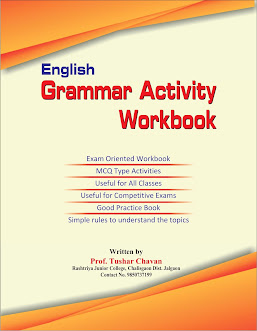Use – Enough / so - - - - that
Use :- Enough
e.g.
1) He is
so clever that he can win the prize.
Ans- He is clever
enough to win the prize.
2) They
are so rich that they can help the poor.
Ans- They are rich
enough to help the poor.
3) He is
so happy that anyone can get his help.
Ans- He is happy enough
to get his help.
4) She
was so brilliant that we could win the group prize.
Ans- She was brilliant
enough for us to win the group prize.
5) It is
so cold that I can use two sweaters.
Ans- It is cold enough
for me to use two sweaters.
6) Raju is so strong that he can lift the heavy bag.
Ans- Raju is strong enough to lift the heavy bag.
7) Radha was so beautiful that she could attract all.
Ans- Radha was beautiful enough to attract all.
8) I am so tall that I can touch the ceiling.
Ans- I am tall enough to touch the ceiling.
9) The student was so active that he could do every work easily.
Ans- The student was active enough to do every work easily.
10) We are so brave that we can accept every challenge.
Ans- We are brave enough to accept every challenge.
|
Rules
- 1)
Write subject and verb of first clause. 2)
Remove ‘so’ and write adjective. 3)
Write ‘enough’ after adjective. 4)
If subjects of both clauses are same, write ‘to’ after enough. Remove ‘that’,
‘subject and auxiliary verb’ of second clause. Write main verb and remaining
words. 5)
If subjects of both clauses are different, write ‘for + subject of second
clause in accusative case’ after enough. Remove auxiliary verb of second
clause. Write main verb and remaining words after ‘to’. 6)
If in second clause subject is like some one, some body, any body, any one
etc. then remove such subject. Do not use for + subject construction for
them. 7) If the
sentence of ‘so – - - - that’ is affirmative only then enough can be used. |
Use :- So - - - - that
e.g.
1) They
are rich enough to help me.
Ans- They are so rich
that they can help me.
2) He was
clever enough to win the competition.
Ans- He was so clever
that he could win the competition.
3) The
bus clean enough for us to sit there.
Ans- The bus is so
clean that we can sit there.
4) The
house is big enough for them to live in it happily.
Ans- The house is so
big that they can in it happily.
5) I am tall enough to touch the branches of the tree.
Ans- I am so tall that I can touch the branches of the tree.
|
Rules
– 1)
Write ‘so’ after the verb of first clause. 2)
Write adjective. 3)
Remove ‘enough’ and write ‘that’. 4)
Take pronoun of the subject of first clause and make it a subject of second
clause. 5)
Write auxiliary verb ‘can or could’ after the subject. 6) If ‘for + subject’ is used, remove ‘for’ and change the subject into nominative case. |


.png)

















13 Comments